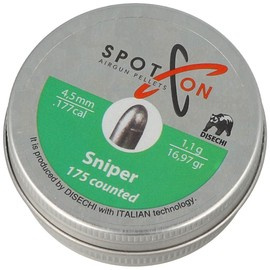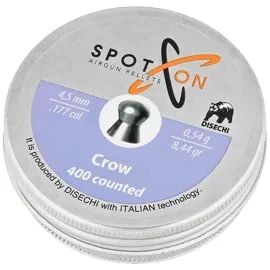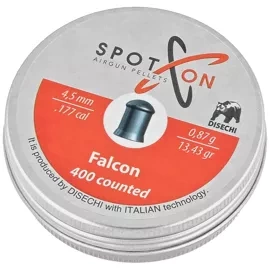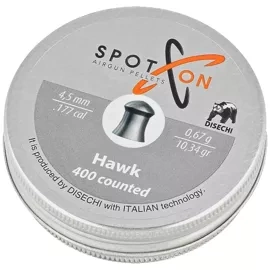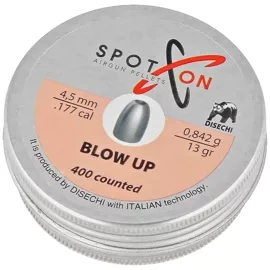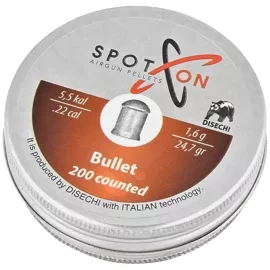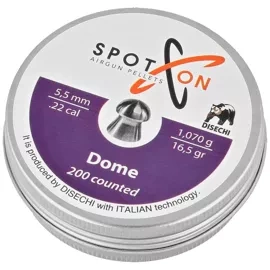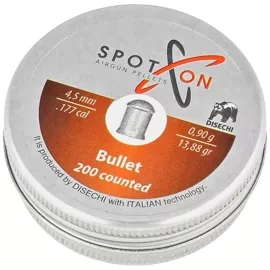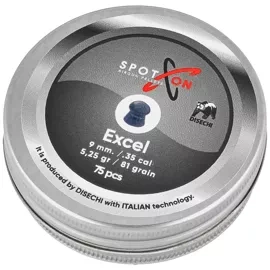What parameters of pellets affect the accuracy of air rifle shots?
In the world of airgun shooting, one of the key factors that determines success is the choice of the right pellet. Accuracy, flight stability, and stopping power—all these aspects are directly related to the characteristics of the pellets we use. In this article, we will examine the most important pellet parameters that affect their performance and effectiveness in various shooting conditions.
Pellet caliber — a fundamental issue
One of the basic parameters to consider when choosing pellets is their caliber. The pellet caliber is the diameter, which must be perfectly matched to the airgun barrel to ensure optimal sealing and energy transfer.
The most popular caliber, mainly used in sport and recreational shooting, is 4.5 mm (.177 inches). This caliber is characterized by a higher muzzle velocity, which is crucial for precise shooting at short ranges. Larger caliber pellets, such as 5.5 mm (.22 inches) or 6.35 mm (.25 inches), offer greater kinetic energy, which is particularly important for long-range shooting and in more challenging weather conditions.
Pellet weight — balancing speed and energy
Another key factor affecting accuracy is the pellet weight. The weight of the pellet directly influences its muzzle velocity and flight stability. Lighter pellets (below 0.50 grams) allow for higher muzzle velocity but lose energy more quickly, which can affect accuracy at longer distances.
Heavier pellets (over 0.70 grams) provide greater stability and perform better in difficult weather conditions, such as strong winds. However, their lower muzzle velocity can be significant when shooting at shorter distances.
Pellet shape — aerodynamics and efficiency
The pellet shape is one of the most important parameters influencing its behavior in flight. The most common pellet shapes are:
-
Flat (Match) pellets: Ideal for short-range shooting, especially for target shooting. The flat head cuts precise holes in the target but loses energy quickly.
-
Rounded (Domed) pellets: A versatile choice for medium and long-range shooting. The aerodynamic shape minimizes air resistance, allowing the pellet to maintain high energy.
-
Pointed pellets: Designed for targets that require deeper penetration at long distances. The pointed head ensures deeper penetration but may be less precise than rounded pellets.
-
Hollow Point pellets: Known for their ability to deform on impact, increasing stopping power.
Pellet manufacturing quality — precision and consistency
Equally important as caliber, weight, and shape is the quality of the pellet’s manufacturing. Pellets with uneven surfaces, deformations, or production defects can significantly reduce accuracy. Renowned manufacturers like Spoton offer pellets of the highest precision, resulting in greater shot-to-shot consistency.
Matching the pellet to the barrel — the key to success
To achieve maximum accuracy, the pellet must be perfectly matched to the airgun barrel. Too loose a pellet can result in a loss of pressure and energy, which affects accuracy. On the other hand, too tight a pellet increases resistance, which can lead to barrel damage.
Impact of weather conditions on pellet accuracy
Weather conditions, such as wind, temperature, and humidity, have a significant impact on pellet behavior in flight. Lighter pellets are more susceptible to wind influence, which can cause them to drift off course. Therefore, when shooting outdoors or at long ranges, it is recommended to use heavier pellets.
Coatings and lubricants — additional technical aspects
Some pellets are coated with special coatings, such as Teflon or copper, to reduce friction between the pellet and the barrel. Using appropriate lubricants, such as Napier Pellet Lube, can further improve the pellet's flight characteristics, protect the barrel from corrosion, and increase speed and accuracy.
Spoton pellets — the best choice for demanding shooters
Spoton pellets are an excellent example of ammunition that meets the highest quality standards. Available in various calibers and variants, Spoton pellets are the ideal choice for shooters with different needs. For example:
-
Spoton Monster 7.62 mm: Ideal for long-range shooting with powerful airguns.
-
Spoton Crazy Solid Slug 5.5 mm: A Hollow Point pellet, perfect for medium-range shooting.
-
Spoton Sniper 4.5 mm: Designed for target shooting and training purposes.
Which pellet parameters affect accuracy?
The answer to this question is complex, as many factors influence accuracy. When choosing pellets, consider the caliber, weight, shape, manufacturing quality, and fit to the barrel. Additionally, weather conditions and the use of appropriate coatings and lubricants can significantly impact shooting effectiveness. Testing different types and weights of pellets in real shooting conditions is key to finding the most optimal solution.
Frequently Asked Questions
What pellet caliber is best for short-range shooting?
The best caliber for short-range shooting is 4.5 mm (.177 inches), characterized by higher muzzle velocity and a flatter trajectory.
Is a heavier pellet always better?
Heavier pellets offer greater stability and perform better at long ranges, but their muzzle velocity is lower. The choice depends on shooting conditions and distance.
How does pellet shape matter?
Pellet shape affects its aerodynamics and flight stability. Rounded (Domed) pellets are versatile and perform well at long ranges, while flat (Match) pellets are ideal for short-range target shooting.
Does pellet quality affect accuracy?
Yes, the quality of the pellet's manufacturing is crucial for accuracy. Pellets with uneven surfaces or deformations can significantly reduce accuracy.
How do weather conditions affect pellet flight?
Wind, temperature, and humidity all affect pellet flight. Lighter pellets are more susceptible to wind, so heavier pellets are better for long-range shooting.
Do coatings and lubricants on pellets matter?
Yes, coatings and lubricants can improve pellet flight characteristics, protect the barrel from corrosion, and increase speed and accuracy.
Conclusion
Choosing the right pellet depends on the type of shooting, weather conditions, and shooter preferences. Each of the discussed parameters—caliber, weight, shape, manufacturing quality, barrel fit, weather conditions, and the use of coatings and lubricants—affects accuracy. Testing different types of pellets in real conditions will help find the optimal solution for a specific airgun and shooting needs.


